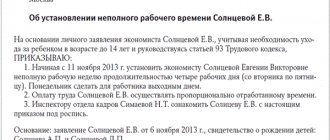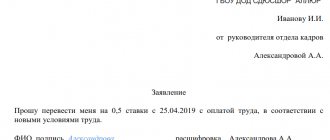Recently, in practice, employers often have difficulties with employees performing professional functions during irregular working hours. Remuneration for the labor of such persons, according to the law, is made according to special rules. Meanwhile, not all employees understand them correctly. Thus, many employees begin to demand paid time off, believing that they have worked significantly; in some cases, they allow themselves to come to work later, arguing that this is due to delays at the enterprise in previous days. Employers, in turn, do not always know exactly whether the staff’s demands are legitimate. Further in the article we will look at the features of irregular working hours, wages under this regime and a number of other nuances associated with overtime work.
General provisions
In accordance with Art. 97 of the Labor Code, the employer has the right to involve an employee in carrying out production tasks beyond the duration of the work shift established for him. The law stipulates 2 cases when this is permissible. Firstly, the employer can hire an employee to perform overtime work (Article 99 of the Labor Code), and secondly, if the employee works during irregular hours (Article 101 of the Code). The last case is the most difficult in practice.
Difficulties in practice
It should be noted that the personnel services and accounting departments of many enterprises often equate irregular working hours with overtime professional activities. In this case, they calculate payment according to general rules, in accordance with the system adopted in the organization. Meanwhile, the law clearly differentiates these regimes.
Overtime work, according to the Labor Code of the Russian Federation, is carried out at the initiative of the employer beyond the duration of the shift established for the employee, or in excess of the normal number of hours for the established accounting period (with a cumulative time recording mode). Accordingly, the establishment of an irregular day presupposes the creation of a special regime of work activity. It is incorrect to equate these working conditions and overtime work (Labor Code of the Russian Federation, Article 99).
The answer to the question about the length of the working day is provided by the Labor Code of the Russian Federation
Its article No. 101 clearly stipulates what an irregular work schedule is: an employee does not constantly, but several times a month, at the verbal request of the manager, continues to work after completing an eight-hour working day.
Consequently, unpaid additional work and frequent delays at work at the request of management do not have any legal basis, no matter how their necessity is presented by the administration and the manager.
However, in accordance with the Labor Code, neither the employee’s consent to the manager’s request to stay late nor additional payment for his work is required.
Nuances
An employee who works under irregular working hours receives wages in the manner established by local regulations of the enterprise. At the same time, he must obey the general regime established in the organization. For example, if at an enterprise the start of the working day is 9.00 and the end is 18.00, then the corresponding employee must come and leave at the specified time. The main point with this regime is that the employee can be involved in activities beyond the normal time limit only occasionally, if necessary. Although in practice there are employers who believe that employees who have an irregular schedule are required to come to work at 8.00 and leave at midnight. This is a wrong opinion.
Some workers believe that they can come to the enterprise not at 9.00, as expected, but at 10.00, or leave when they see fit. It's a delusion. The fact is that the establishment of an irregular day does not imply the introduction of a flexible schedule. Accordingly, employees are not exempt from liability for violations of discipline.
Shortened working hours
A regime of reduced working hours is the establishment of a shorter working week compared to normal working hours and a reduced working day (shift) while maintaining or increasing wages compared to wages for work with normal working hours.
Shortened working hours (Article of the Labor Code of the Russian Federation) are established only for a certain category of employees:
- minor workers;
- for employees who are disabled people of group I or II;
- workers engaged in work with harmful or dangerous working conditions;
- teaching staff;
- medical workers.
The duration of a working day (shift) with reduced working hours should be no more than 8 hours for a 36-hour work week and no more than 6 hours for a 30-hour work week or less.
Who can have irregular working hours?
The positions of workers working in such conditions can be very different. The law does not limit the employer's choice. The employer can independently establish the categories of employees for whom such a regime can be established. However, the employer must develop and approve a specific list of positions. It is included in the employment agreement, collective agreement or other local document of the enterprise.
The list may include employee positions:
- The duration of their working activity cannot be accurately calculated. They, in particular, are company directors, business and maintenance personnel, technical employees, etc.
- Independently drawing up a plan for the implementation of assigned tasks.
- The working day (shift) is divided into intervals of unspecified duration.
There is no need to include in this list all positions provided for in the staffing table, since the inspection authorities will consider such an action irrational.
The list of positions for workers with irregular hours is agreed with the representative body - the trade union.
Subtleties of the work schedule
- The manager does not have the right to attract employees with irregular hours to perform duties that are not within the scope of their usual activities.
- It is prohibited to introduce irregular working hours for the entire team of the company.
- Weekends and holidays are non-working days for employees with irregular schedules. Involving them to work on such days is accompanied by additional payment (unless such working conditions are specified in the contract).
- If the labor inspectorate establishes regular overtime at the company, the manager will be punished in the form of a mandatory fine. In addition, he may be required to pay for overtime hours as overtime.
The head of the company and his subordinates are obliged to know their rights when introducing an irregular work schedule into their activities. Thus, knowledge of rights and laws will help to avoid abuse of official duties on the part of the founder and failure to fulfill legal obligations on the part of his employees.
Example
Usually the list is compiled as a separate document and attached to the Rules of Procedure. The content must refer to the specific article of the Labor Code according to which the list is formed. To do this, you can use the following wording: “In accordance with the provisions of Article 101 of the Labor Code of the Russian Federation, due to production needs, the list of positions with an irregular schedule includes the following positions:
- Sales department: head of department, manager.
- Administration: head, deputy head, chief. accountant, driver, secretary.
Employees of these positions are assigned additional paid leave for irregular working hours (Labor Code of the Russian Federation, Article 119). Its duration is 5 calendar days.
Irregular regime with incomplete days
Is such a situation possible in practice? Quite. The legislation does not prohibit the establishment of an irregular schedule for part-time work. Moreover, Rostrud has repeatedly spoken out on this issue, pointing out the existence of such a possibility.
Design features
Many employers believe that familiarizing an employee with a local act, according to which the corresponding position is included in the list for which a special work schedule is assigned, is sufficient to periodically involve a person in work activities in excess of the established norm. At the same time, some managers do not consider it necessary to formalize the involvement of personnel and limit themselves to verbal orders.
It must be said that approval of the list of positions is extremely insufficient. It is necessary to document every time an employee is involved in irregular work. If, before joining the staff, it is known that this employee will have to work in this mode, before concluding an agreement, he should be familiarized with local regulations establishing a list of relevant positions, the type, and amount of compensation for irregular working hours. After this, an employment agreement is drawn up. It necessarily includes a condition on irregular working hours according to the Labor Code of the Russian Federation, leave for work in this mode and other essential points. The need to include such a clause in the contract is determined by the provisions of Article 57 of the Code. According to the norm, one of the essential terms of the agreement is the work and rest regime, if it differs from the general rule provided for personnel at the enterprise.
After the conclusion of the contract, an order is issued by the head of the organization. It should contain a reference to a special labor regime in the column “Conditions of admission, nature of work activity.” After this, an entry is made in the work book (without indicating an irregular day), as well as in a personal card.
For whom an irregular schedule cannot be established?
This schedule is not set for everyone.
It is impossible to register with irregular working hours those people whom the law, for some reason, prohibits from being involved in overtime work.
These include minors, pregnant women, disabled people, single parents and some other groups. This is due to the fact that even a single case of such citizens working outside the established schedule is regarded as a violation of the employee’s rights.
At the same time, the positions in which these categories of citizens are employed may be included in the list of those who are required to work irregular hours. There is simply no need to introduce this regime for specific people.
Irregular working hours can be established only for part of the enterprise’s employees, and not for all at once.
Registration of a new employee
The list of positions alone is not enough to assign an irregular schedule to everyone working in these areas. This must be discussed separately with each person and reflected in the employment contract.
Likewise, such a clause of the contract will not be considered valid if the company does not have the list mentioned earlier.
The scheme for registering an employee for irregular work will look like this:
- Familiarization of the future employee with the list of positions for which an irregular schedule is established;
- Notifying him about the compensation (their type and amount) that is provided for work in such a regime;
- Drawing up and signing an employment contract, which necessarily includes the condition of working with irregular hours;
- Issuance of a hiring order, which also indicates a special regime for this employee;
- Filling out the work report, in which you no longer need to make any additional notes.
Important point
In practice, it may happen that an employee’s position is included in the list of positions with an irregular schedule already in the process of the person’s work activity. In such situations, the law requires that employees be informed in advance about upcoming changes. Notification is provided in writing 2 months before the introduction of the new regime.
The provisions of Article 74 of the Labor Code allow for changes in working conditions solely as a result of changes in the organizational or technological system at the enterprise. We are talking, in particular, about the introduction of new production technology, structural reorganization, etc. The employer must have justified reasons for including a specific position in the list.
Employer Responsibilities
The employee does not always agree to change his schedule. If an employee refuses to work during irregular hours, the employer must offer him in writing another vacant position that meets his qualifications, a lower position, or a job that pays less, taking into account the employee’s health condition. If such a position or work does not exist at the enterprise, in accordance with Part 1 of Article 77 of the Labor Code, the employment contract is terminated.
Changing an employee's schedule to irregular
Changes can be made to the list of workers with irregular hours if working conditions have been changed in any way. Any additions to the list must provide two months or more notice to all affected employees.
If an employee worked as usual, and then it became necessary to establish an irregular day for him, if he agrees to this, it is necessary to conclude a special addition to the contract with him. The same thing happens in the case of transfer to a new position that requires work in irregular hours.
If an employee does not agree to switch to a new regime, the employer must offer him a new place, always in writing. The proposed position may be similar to the previous one in terms of qualifications and pay, or lower. But it must be such that the employee can occupy it for health reasons.
When there is no opportunity to offer such work, or the employee refuses it, the employment contract is terminated on the basis of Article 77 (clause 7, part 1) of the Labor Code.
Recording and payment of overtime during irregular working hours
There are two opinions regarding the reflection of processing. Some experts believe that it is necessary to fix it. The fact is that in accordance with Part 4 of Article 91 of the Labor Code, the employer is obliged to keep records of the time worked by each employee. For this, as a rule, a time sheet is used. T-12 and T-13. In addition, at individual enterprises information is reflected in journals.
If an employee is late, most likely the person responsible for entering information into accounting documents will leave before him. Consequently, there will be no one to reflect the information. In such situations, it is advisable to issue a written order. You can also indicate in the job description or the employment agreement itself that the employee, for example, will stay at work for 3 hours twice a month to draw up a report. There is no need to establish a condition that the employee must stay after his shift every day or even every other day. Otherwise, when the employee contacts the labor inspectorate, such an order will be declared illegal.
Other experts believe that indicating information about overtime on the timesheet leads to the fact that irregular working hours and overtime work can be confused. If the accountant considers the mark in the document to be processing data, he will charge an additional fee.
In case of irregular working hours, however, it is necessary to keep track of time. This not only complies with legal requirements, but also has practical significance for the manager of the enterprise. The fact is that using the timesheet, the employer can track the frequency of going beyond the working day. Accounting will also be very useful in case of any emergency. The timesheet information will allow you to accurately determine whether a particular employee was present at the enterprise at that moment or not.
If the work schedule is irregular, payment for overtime hours is not made. However, the law still provides guarantees for employees working in such conditions. Article 119 of the Labor Code stipulates that such employees are granted additional leave (paid), the duration of which is determined in the collective agreement or internal regulations. In this case, its duration must be at least 3 days (calendar). Vacation can be added to the main one or taken separately.
The right to additional rest is granted regardless of the presence or absence of overtime.
The difference between overtime and irregular working hours
The legally established limit of normal working hours cannot exceed 40 hours per week, but there are exceptions to this rule in the form of employees performing overtime or performing their work duties within irregular working hours.
Overtime work and irregular working hours have one common essential feature, namely, in both cases we are talking about the performance of work duties outside of normal working hours, outside the established working hours, daily work (shift), as well as work in excess of the normal number of working hours per accounting period. period.
However, these concepts should not be confused, if only because when talking about overtime work we mean one of the types of work outside the normal working hours, and overtime work is a completely separate mode of work with the employee performing it occupying a free vacancy according to the staffing table as if it were their own within the enterprise and beyond.
The Labor Code of the Russian Federation does not directly establish any requirements for the registration of involvement in overtime work, however, given the need to obtain the written consent of the employee for work with irregular working hours, it will be necessary for the management of the organization to issue a corresponding order.
If previously an employer could apply mandatory overtime work for employees only in exceptional cases provided for by law, and only with the permission of the relevant elected trade union body, now the list of grounds for carrying out such work is practically unlimited. In any case, overtime work should not exceed 4 hours for each employee for 2 consecutive days and 120 hours per year.
Overtime work is compensated by increased pay (for the first 2 hours of work, no less than one and a half times the amount, for subsequent hours - no less than double the amount; in this case, the specific amounts of payment for overtime work may be determined by a collective agreement or employment contract). However, instead, at the request of the employee, overtime work can be compensated by providing additional rest time, but not less than the time worked overtime.
In contrast to overtime work, an irregular working day is a work regime in accordance with which individual employees may, if necessary, be occasionally involved in the performance of their labor functions outside the normal working hours (Article 101 of the Labor Code of the Russian Federation). Irregular working hours are one of the working conditions for certain categories of workers. These conditions, as a rule, relate to either the responsible nature of the work or the possibility of overtime for persons whose working hours on certain days cannot be counted.
An irregular working day does not change the established standard of working time, and permitted overtime in excess of the established working time should not lead to the transformation of an irregular working day into an extended one. The employer has the right to involve the relevant persons to work outside of normal working hours only in exceptional cases and cannot oblige them in advance to constantly work on a special schedule outside the working day, and the range of duties and volume of work for employees with irregular working hours must be provided in such a way that these persons, as generally worked during normal working hours.
Employees with irregular working hours are subject to rules defining the start and end times of work, weekends and holidays, breaks for rest and meals, and the procedure for recording working time in the organization.
Resolution of the People's Commissariat of Labor of the USSR dated 02.13.28 No. 106 “On workers with irregular working hours” established categories of workers who can be assigned irregular working hours.
A specific list of positions for employees with irregular working hours must be established by a collective agreement, agreement or internal labor regulations. The employer does not have the right to establish irregular working hours for persons whose positions are not included in the above list. In addition, in practice, irregular working hours should not be established for those categories of workers whose involvement in overtime work is not allowed, for example, minors or disabled workers.
As compensation for special working conditions, employees with irregular working hours are provided with annual additional paid leave, the duration of which is determined by a collective agreement or the internal labor regulations of the organization and which cannot be less than 3 calendar days.
In the event that such leave is not provided, overtime in excess of normal working hours, with the written consent of the employee, is compensated as overtime work. 11,865 views
Controversial point
In some cases, employees, believing that they have worked a lot (for example, performed production tasks beyond the normal duration of the shift every day for a month), ask the employer for an additional paid day of rest. Of course, their desire is quite understandable. Employees believed that they would only overwork occasionally, but they were constantly involved. However, overtime hours under irregular hours are not equal to overtime hours. In the latter case, the employee has the opportunity to choose either monetary compensation or additional rest (Article 152 of the Labor Code of the Russian Federation). For an irregular schedule, only one compensation is established by law - vacation. Accordingly, the employer may not satisfy the request for an additional paid day of rest.
Work at night, on weekends and holidays
Let us briefly consider how irregular working hours are paid in such cases. First of all, it should be noted that the involvement of employees in work at night, on a holiday or a day off, regardless of the regime, is carried out in compliance with the requirements established by the Labor Code. In particular, the provisions of Article 113 of the Code apply. According to the norm, it is necessary:
- Obtain the employee's consent in writing.
- Take into account the opinion of the elected body of the trade union.
- Notify the employee of the right to refuse work upon signature.
- Issue an order.
In addition, the employer must take into account the employee’s health condition. If the latter has contraindications, involvement in overtime work is not allowed.
As for payment, the double rate is due:
- Piece workers. Double piece rates are used in the calculations.
- Persons whose work is paid at hourly (daily) rates. For them, the calculation is made using a double rate.
- Salaried employees. They make a calculation in the amount of no less than a single rate (hourly or daily) in addition to the salary if the subject worked within the monthly norm, and if in excess of it - in the amount of a double rate.
As for working at night, even with an irregular schedule it is recognized as a deviation from the norm. Consequently, involvement in night work is paid at an increased rate - at least 20% is added to the salary (rate).
Working overtime
Working overtime is not grounds for providing additional paid leave. Based on the consent of the employee, in accordance with Article No. 152 of the Labor Code, overtime work does not have to be paid, but can be compensated by days of additional rest, “time off”, the number of which must correspond to the overtime worked.
For what reason can employees be required by their employer to work overtime?
Firstly, when there is a need to complete the work, otherwise failure to complete it will lead to damage to property or death of people, as well as a threat to their lives. Secondly, if failure to complete the work will cause a significant part of the employees to stop working in production. Thirdly, if production cannot be stopped and the employee does not show up for his shift for any reason. In any of these cases, the employee must confirm in writing his consent to work beyond the norm. However, in some cases, the administrator has the right to legally involve employees in overtime work without their consent.
Such works are:
- urgent work, failure to complete which will lead to accidents, catastrophes, and natural disasters;
- work to eliminate the interruption in the functioning of basic life support systems (heating, water supply, electricity, communications, gas supply, etc.);
- work to prevent the consequences of emergency situations;
- work in emergency situations.
Unlike work beyond the norm, an irregular day, fixed in a contract, does not require the employee’s consent to perform his duties more than 8 hours a day. This work is not formalized by order, additional payment is not provided, overtime is not specified, and the employee is entitled to at least three days of additional leave.
Features of payment for overtime work
They are mentioned in Article 152 of the Labor Code of the Russian Federation. According to the norm, overtime work for the first 2 hours is paid at one and a half times, and for subsequent periods - at double. Specific sizes can be established in a collective or labor agreement or local act.
The calculations use the average monthly and average daily earnings. In Art. 152 does not specify a specific calculation procedure. In this regard, as the Ministry of Health and Social Development explains in Letter No. 16-4/2059436 of 2014, calculations can be made according to the rules of Art. 153. In accordance with it, the minimum amount of double payment is a double tariff without incentives and compensation payments. The hourly rate should be calculated by dividing the salary established for the employee by the average monthly number of hours, depending on the length of the week. Using average monthly and average daily earnings allows you to receive the same amount for the same number of hours worked in different months.
According to Art. 152 of the Labor Code, cash payments can be replaced by additional rest at the employee’s choice. In this case, its duration must be no less than the duration of overtime work.









